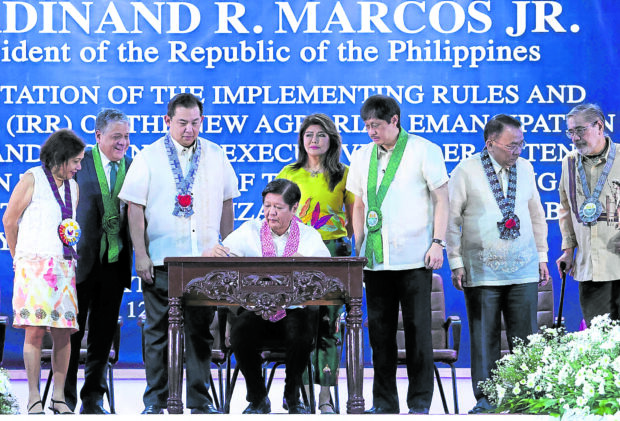
TWO MORE YEARS President Marcos signs Executive Order No. 40 at the DAR office in Quezon City. Witnessing the signing were Sen. Cynthia Villar, Special Assistant to the President Antonio Lagdameo Jr., House Speaker Martin Romualdez, Senator Imee Marcos, and DAR Secretary Conrado Estrella III. INQUIRER/ MARIANNE BERMUDEZ
President Marcos on Tuesday signed an executive order extending the moratorium on the payment of amortization by agrarian reform beneficiaries (ARBs) due to the “continuing disruptive effects” of the pandemic.
Under Executive Order No. 40, the President extended by two years or until Sept. 13, 2025, the amortization payment of the principal obligation and interest on the debts incurred by ARBs.
The new EO extended the agrarian debt moratorium implemented under Executive Order No. 4 signed on Sept. 13, 2022.
“This (EO No. 40) provides for the moratorium on the payment of the principal obligation and interest on amortization payable by the agrarian reform beneficiary, to include even those who were not covered by the New Emancipation Law,” Mr. Marcos said.
The President said it was “necessary to provide continuing economic relief to agrarian reform beneficiaries,” citing the “continuing disruptive effects of the pandemic, the new challenges posed by the ongoing crisis in Ukraine, and the pernicious effects of climate change.”
To help ARBs recover
According to the new EO, extending the moratorium will assist ARBs “in the process of recovery, and ensure food security in the country amidst these global uncertainties.”
The EO stated that the Land Bank of the Philippines and the Department of Agrarian Reform (DAR) would jointly formulate the rules and regulations to implement the new executive order.
Mr. Marcos signed the executive order extending the moratorium on agrarian debt during a ceremony at the DAR office in Quezon City where the implementing rules and regulations of the Republic Act No. 11953, or the New Agrarian Emancipation Act were also presented.
On the eve of his 66th birthday, Mr. Marcos on Tuesday said he hopes for a better agriculture sector for the country and good weather for Filipino farmers’ crops to ensure an abundant harvest.
Birthday wish
“I wish the agriculture will already be fixed and we should be able to really know the weather. Is it wet season or dry season already? So that we can help our farmers,” the President told reporters when asked if he had any birthday wish.
The country is just beginning to feel the effects of the El Niño weather phenomenon while recent typhoons and monsoon floods have destroyed crops and disrupted food supply chains, contributing to the increase in agricultural products.
Mr. Marcos, as concurrent agriculture secretary, has been organizing programs to increase food production, ensure sufficient water for irrigation, improve the agriculture industry value chain, secure investments in agribusiness, make agriculture more resilient to climate change and distribute various forms of assistance to small farmers. —With a report from Jerome Aning INQ
READ: Marcos vows support services for agrarian reform beneficiaries